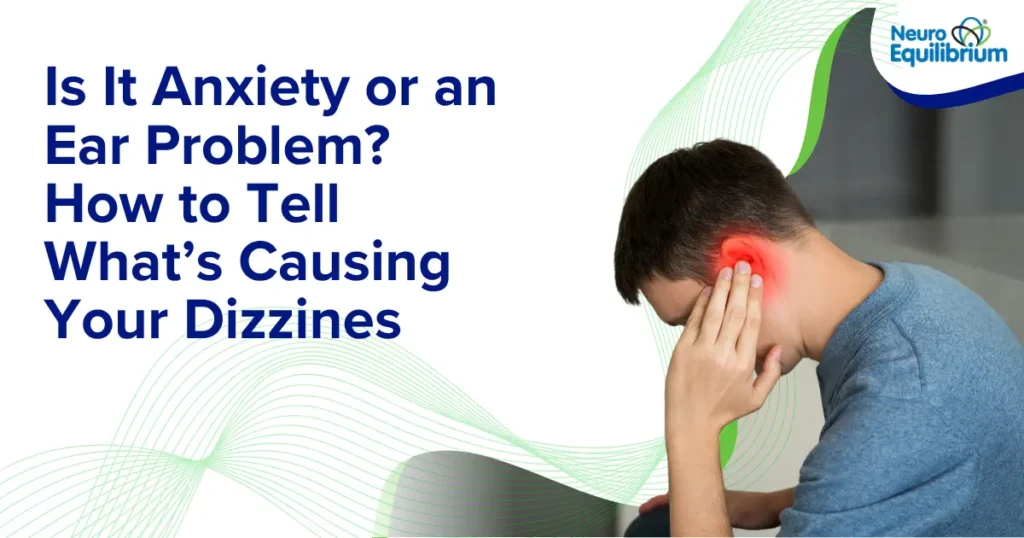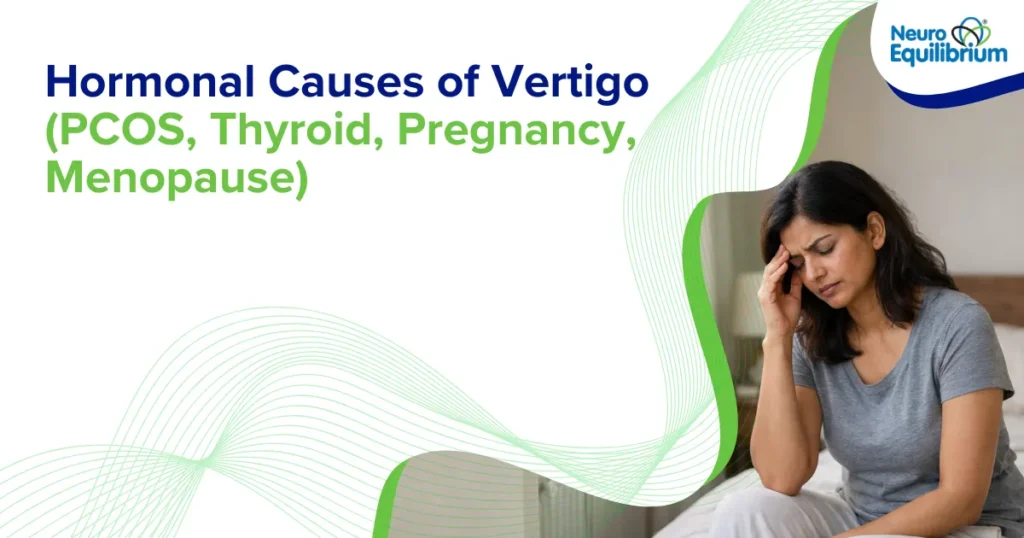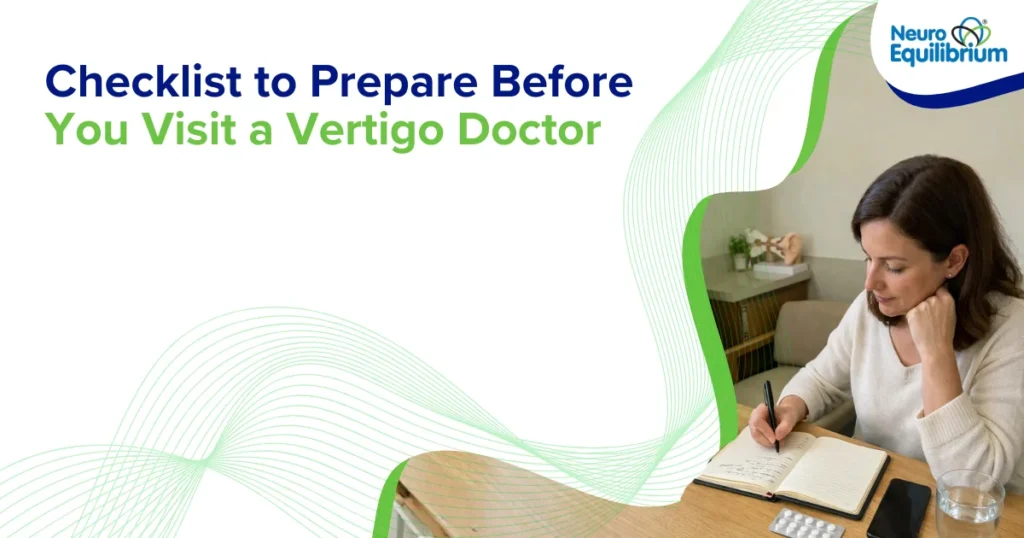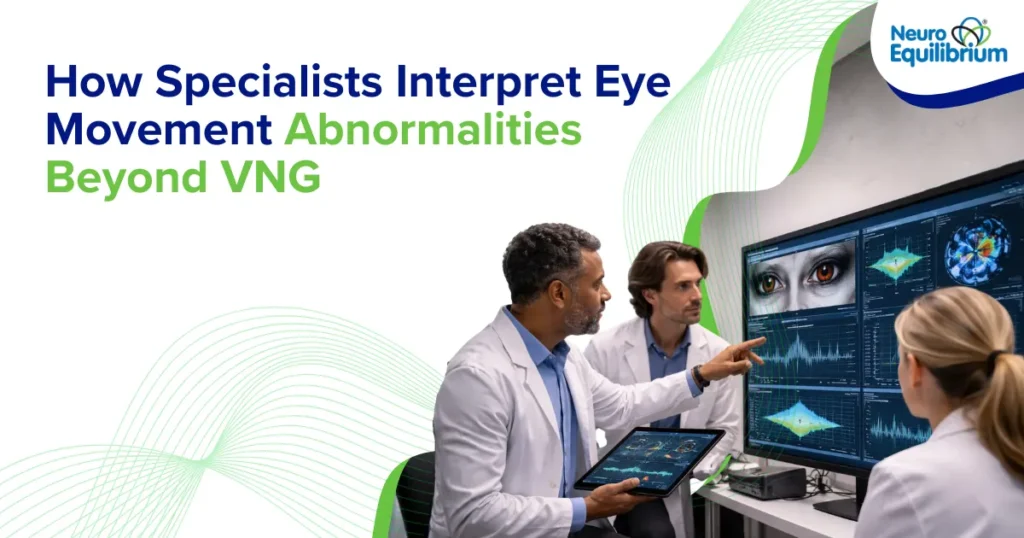Dizziness is a common and often frightening experience. It can feel like the world is spinning, a sense of unsteadiness, or what many describe as “chakkar.” Around 5% of people experience it at some point, which means nearly 60 million people in India alone. In fact, balance and dizziness disorders affect about 15% of the global population, which includes around 180 million Indians.
The problem is that dizziness is often misunderstood. While vertigo is usually a sign of issues in the inner ear or brain, it can also be linked to psychological conditions like anxiety. Because of this, people often confuse inner ear problems with anxiety or the other way around. But to truly feel better and take back control of your life, it’s important to identify the real cause.
When dizziness becomes frequent or long-lasting, it can lead to loss of confidence, fear of falling, and even social isolation. That’s why getting the right diagnosis and treatment is so important.
Know More About Ear Problem
- What Is Ménière’s Disease?
- Tinnitus Explained: Why It Happens and How to Make It Stop
- What Is Ear Balance Treatment and When Do You Need It?
How Anxiety and Inner Ear Issues Cause Dizziness
Dizziness and vertigo can come from many different health issues. In fact, there are around 40 known problems that can start in the inner ear or brain and lead to dizziness. While they may feel the same—like spinning, feeling unsteady, or having a foggy head—the causes can be very different.
Inner Ear Causes (Also called Peripheral Vertigo)
These types of dizziness come from problems in the inner ear:
- BPPV (Benign Paroxysmal Positional Vertigo): This is one of the most common causes of vertigo. It happens when tiny crystals inside your inner ear (called otoliths) move out of place and get into the wrong part of your ear. When you move your head, these crystals shift and make you feel like the world is spinning. It can happen after an injury, surgery, long bed rest, or even certain positions during workouts or hair treatments. But in most cases, it just happens on its own.
- Vestibular Neuritis / Labyrinthitis: These are infections or inflammations of the nerve that controls balance and hearing. They are usually caused by a virus. Labyrinthitis can cause intense spinning and even hearing loss in one ear. This is serious and needs to be treated quickly with strong medicines like steroids.
- Ménière’s Disease: This is a condition where there’s too much fluid pressure in the inner ear. It causes dizziness, ringing in the ears (called tinnitus), hearing problems, and a feeling of fullness or pressure in the ear.
- Other Inner Ear Causes: In children, ear infections or rare issues like an enlarged vestibular duct can also lead to dizziness.
Anxiety-Related Causes
Sometimes, dizziness can be linked to stress, anxiety, or mental health conditions:
- Chronic Dizziness and PPPD (Persistent Postural Perceptual Dizziness):PPPD is a condition where individuals experience a persistent sensation of unsteadiness or rocking, particularly when standing, moving, or navigating visually complex environments like busy streets or crowded stores. While not directly caused by anxiety, PPPD can trigger anxiety, and in turn, anxiety can intensify the symptoms of PPPD—creating a cycle that’s difficult to break. This often leads to a heightened sensitivity to certain movements or environments, reinforcing the dizziness and discomfort.
- Stress and Anxiety: Stress and anxiety don’t always cause vertigo, but they can make it worse or feel similar. For example, someone with a vestibular migraine might get dizzy during stressful times.
How They Can Feel the Same
No matter the cause, dizziness often feels like spinning, being off-balance, or “chakkar.” Some people feel lightheaded or wobbly when they move. This can be scary and make people avoid going out, talking to others, or doing everyday things—especially if the dizziness happens often.
Key Differences: How to Tell What’s Causing Your Dizziness
While dizziness can be confusing, observing specific patterns and accompanying symptoms can offer clues:
| Feature | Inner Ear Causes | Anxiety Related / Chronic Dizziness) |
| Trigger Patterns | Often triggered by specific head movements (e.g., getting up, turning in bed, bending down. ( BPPV). Can be spontaneous or post injury. | Aggravated by upright posture, body movement, or moving visual fields (PPPD). Can be exacerbated by stress, fear, or negative thoughts. |
| Accompanying Symptoms | May include hearing loss, tinnitus (ringing in ears), or sensation of fullness in the ear (Meniere’s). Nausea and vomiting can occur with acute vertigo. Jerky eye movements (nystagmus) are often present. | Can be accompanied by symptoms of anxiety like fear, hypervigilance, and avoidance behaviors. |
| Duration of Episodes | BPPV spells typically last less than a minute, or less than 30 seconds. Vestibular migraine can last from minutes to several hours or even days. Acute labyrinthitis can last a few days. Persistent unsteadiness can occur in conditions like bilateral peripheral vestibulopathy. | PPPD is characterized by persistent vestibular symptoms. Chronic dizziness can cause long term distress and anxiety. |
| Specific Sensations | Often described as intense spinning (true vertigo). | May feel more like unsteadiness, swaying, or a rocking sensation. |
How Diagnosis Works and Why You Need It
At NeuroEquilibrium, we run the India’s largest group of special clinics that treat dizziness and balance problems. We have over 200+ clinics all over India. Our team has special tools and knowledge to find out what’s causing your dizziness and how to treat it.
Here’s how we do it:
1. Understanding Your History:
First, we ask detailed questions about your symptoms, past health problems, and what makes your dizziness better or worse. This helps us understand your condition better.
2. Physical Checks:
We look at how your eyes move, how well you balance, and check your nerves to see if anything looks off.
3. Special Tests:
We use advanced machines to run tests that help us find the exact reason for your dizziness. These tests include:
- VNG (Videonystagmography): This checks your eye movements while we move your head or body into certain positions. It helps us find problems like BPPV (a common inner ear issue).
- SVV (Subjective Visual Vertical): This test checks if your brain can tell what’s straight up and down. That shows how well your balance system is working.
- DVA (Dynamic Visual Acuity): This checks how clearly you can see while your head is moving.
- vHIT (Video Head Impulse Test): This test checks if the balance canals in your inner ear are working properly.
- Audiometry (Hearing Test): This finds out if hearing problems are linked to your dizziness, especially in conditions like Meniere’s disease.
- Posturography: This checks how steady you are when standing in different ways.
- Neurological Tests: These tests help us see if your dizziness is coming from the brain or nerves.
Your Treatment Plan:
After we understand what’s causing your dizziness, we make a custom treatment plan just for you. This could include:
- Balance exercises
- Simple head movements to fix crystal problems in your ear
- Medicines
- Help from other doctors if needed
At NeuroEquilibrium, we make sure you get the right care which is personalized so you can feel better and get your life back to normal.
What to Do If You’re Still Unsure
If you’re experiencing dizziness and are unsure of the cause, taking proactive steps is essential:
- Track your symptoms: Pay attention to what you are feeling, what triggers or worsens your dizziness (e.g., head movements, stress, specific foods), and any accompanying symptoms like headache, vision changes, or weakness. Keeping a food journal can help identify potential dietary triggers, especially for vestibular migraine.
- Visit the right specialist: Seek evaluation from a doctor, preferably an expert in treating vertigo and dizziness, such as an ENT specialist, neurotologist, or neurologist.You can visit your nearest Neuroequilibrium branch.
- Do not ignore persistent symptoms: Vertigo is not a minor issue to be neglected; it is a symptom that demands attention. Ignoring it can hinder daily activities, shake confidence, and in older patients, increase the risk of falls and related injuries.
- Avoid prolonged use of suppressants: While anti vertigo medications might be prescribed for acute symptoms, they should generally not be taken for more than a few days (e.g., three days), as prolonged use can interfere with the body’s natural recovery mechanism (central compensation). The focus should always be on treating the underlying cause, not just suppressing the symptoms.
Conclusion: Don’t Guess, Get Checked
You do not need to live in fear and uncertainty of dizziness. Vertigo can be healed when its cause is identified. Rather than self-diagnosing the cause of dizziness, caused either by anxiety or inner ear issue, a professional assessment is the most important step to take.
Vertigo and balance disorders can be managed through the right diagnosis, and then a tailor-made management program to ensure patients are symptom-free, and regain their sense of balance, confidence and quality of life. Patients that have been languishing because of years of pain can even receive a substantial relief when the root of the problem is detected and managed accordingly.
Sources
- Medical News Today. (2024). Anxiety and dizziness: Why does it happen and how to treat. https://www.medicalnewstoday.com/articles/anxiety-and-dizziness (Medical News Today)
- Healthline. (2020). Can stress cause vertigo? Risk factors, treatment, and coping tips. https://www.healthline.com/health/can-stress-cause-vertigo (Healthline)
- Healthline. (2021). Anxiety and dizziness: What’s the connection? https://www.healthline.com/health/anxiety/anxiety-dizziness (Healthline)
- StatPearls / NCBI Bookshelf. (2023). Vestibular Dysfunction. In: StatPearls. https://www.ncbi.nlm.nih.gov/books/NBK558926/ (NCBI)
- Better Health Victoria. (n.d.). Dizziness and Vertigo – Causes, Diagnosis & What to Do. https://www.betterhealth.vic.gov.au/health/conditionsandtreatments/dizziness-and-vertigo (Better Health Channel)
- MSD Manuals. (n.d.). Dizziness and Vertigo – Ear, Nose, and Throat Disorders. https://www.msdmanuals.com/home/ear-nose-and-throat-disorders/symptoms-of-ear-disorders/dizziness-and-vertigo (MSD Manuals)
- NCBI / PubMed Central. (2020). Disability and Anxiety in Vestibular Diseases. https://pmc.ncbi.nlm.nih.gov/articles/PMC7781499/ (PMC)
- Very Well Health. (n.d.). Does Anxiety Cause Vertigo? Understanding the Link Between Anxiety and Dizziness. https://vertigodetective.com/does-anxiety-cause-vertigo-understanding-the-link-between-anxiety-and-dizziness/ (Vertigo Detective)
FAQs
What are typical symptoms of dizziness due to an inner ear problem?
The symptoms comprise strong sensations of spinning, hearing loss, ringing in the ears (tinnitus), a full sensation in the ears, and nausea.
Book a consultation at your nearest NeuroEquilibrium Clinic today.
What is the connection between anxiety and dizziness?
Dizziness that is associated with anxiety tends to be more of a feeling of constant light-headedness, wobbliness, or rocking, and can be exacerbated by stress or overcrowding.
Book a consultation at your nearest NeuroEquilibrium Clinic today.
What can I do to distinguish between anxiety-related dizziness and inner ear problems?
Specific triggers (e.g. head movements) and auditory symptoms are common with inner ear dizziness whereas anxiety induced dizziness is chronic, stress related and typically has no auditory symptoms.
Book a consultation at your nearest NeuroEquilibrium Clinic today.
Does dizziness have a treatment?
Treatments consist of repositioning maneuvers, medication, lifestyle changes, and cognitive behavioral therapy, depending on the cause, yes.
Book a consultation at your nearest NeuroEquilibrium Clinic today.
So when do I need to see a specialist regarding my dizziness?
See a doctor when dizziness is common, increasing with time and has accompanying deafness and extreme nausea, or neurological dysfunction.
Book a consultation at your nearest NeuroEquilibrium Clinic today.
















